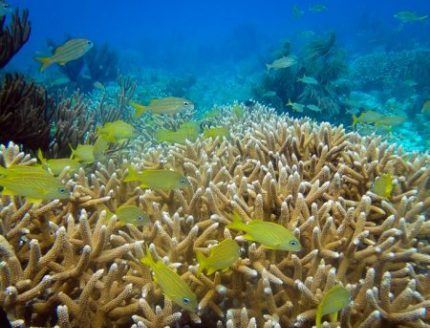Much of the world’s coral reefs are dying off.
Increasingly acidic seawater damages coral’s external skeleton and prevents new growth. Warming waters caused by climate change can drive off or even kill an important partner to a reef’s survival—algae. These photosynthetic algae, called zooxanthellae, give coral the vibrant colors that attract snorkelers and divers worldwide.

Zooxanthellae and coral have a mutualistic relationship, meaning they rely on one another. The algae live within the tissues of the coral. In exchange for a safe habitat, the algae photosynthesize nutrients and can produce up to 95% of the food coral needs to survive and grow. Recent research shows that this mutually beneficial partnership has existed for over 210 million years.
When water is too warm, the corals become stressed and expel the zooxanthellae from their tissues, a phenomenon known as coral bleaching. Bleached coral is less resilient to changing environments and more susceptible to disease.
With so many threats to reef survival, scientists are investigating why reefs are rejecting one species of zooxanthellae, Durusdinium trenchii.
Unlike other algae, D. trenchii, a zooplankton species native to Asia, can take the heat and survive in warmer waters. Now, researchers at Florida International University are investigating whether D. trenchii can successfully establish itself in Florida’s reef system.
So far, experiments have shown that the Asian algae struggles to colonize certain types of coral in Florida due to its inability to skirt the coral’s immune response.
This is because when foreign pathogens attack the coral, the coral’s immune response destroys the cell containing the algae through a process known as autophagy. D. trenchii is not yet able to suppress the autophagy, which the study authors attribute to a longer evolutionary history between native algae and coral species.
In other words, the coral is not yet well-acquainted with D. trenchii and considers it an unwelcome stranger.
According to FIU News, the study’s lab director, Mauricio Rodriguez-Lanetty, is researching how to manipulate the genetic makeup of either D. trenchii or the host coral to create a more favorable pairing.
Although it is uncertain whether a more heat-tolerant species of zooxanthellae can provide the coral with the same level of nutrition as native varieties, the hope is that by successfully colonizing Florida coral with a more resistant species of zooxanthellae, scientists can help stave off bleaching events and make our reefs more resilient.
And this is important, especially in Florida. The National Oceanic and Atmospheric Administration values reefs in southeast Florida at $8.5 billion. With $2 billion in local income and 70,400 jobs hanging in the balance, Floridians have a real stake in the well-being of coral reefs.
“This research is important because coral reefs are declining globally and they have an economic impact, maintain fisheries and provide a basis for future research,” said Emmanuel Medrano, the paper’s lead author.
Read more about this coral research here: https://www.frontiersin.org/articles/10.3389/fmicb.2019.01153/full
To learn more about what you can do to help, visit our post: Coral Reefs Are In Trouble: Here’s How You Can Help